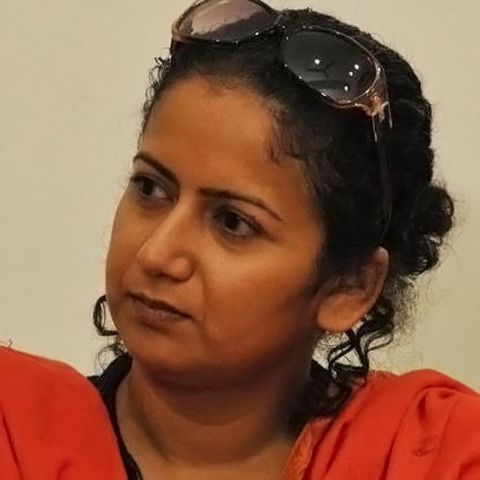Where the streets have two names: Nazish Brohi uses anecdotes to explore ‘circulation of violence’
Honour killings are not a thing of the past, says the researcher at a talk at T2F.

"Change will come. What we need is for women to come together to steer that change," Activist Nazish Brohi.
Researcher and activist Nazish Brohi held the attention of the audience at The Second Floor (T2F) on Sunday evening with anecdotes and stories of women she has spoken to for her research. Among them was Zameera, who gave directions to Brohi through not only landmarks but insight into the menace of sexual harassment [“On your left side will be the lafangaay who stare at all women passing by”], rampant violence [“Cross the laashon wala nullah”] and the mismanagement of garbage disposal [“You’ll have to cross the kachra on the road.”]

“Zameera’s directions unravelled a fascinating cartography of Karachi, and so did my walk with Zeba, a woman who worked at a factory in Baldia Town,” Brohi said at the talk, titled ‘Karachi: Where the Streets Have Two Names’. “She showed me the cold drink corner where her brother started buying drugs and the beauty parlour where she got her chuttiya [braid] cut off as reaction to a ‘rishta viewing’. These everyday details are important to understand the lives of these women.”
Brohi also told the story of Rani and Farah, who were among the 29 women killed in a stampede at Faizan-e-Madina in 2006. “Edhi’s ambulances reached the venue on time, even Faisal Edhi was there but the men of the religious party who had organised the sermon did not allow the paramedics to treat the injured women, saying they were na mehram,” said Brohi. “The women could have been treated but weren’t. Twenty nine women died that day and not a single FIR was registered.”
Brohi has identified different forms of violence against the female gender through these narratives. “The focus is not on determinants or even perpetrators of violence but on its circulation.”
Breaking free of conformity
“Women in Lyari reject peace - they say we don’t want amn, we want sukoon. They choose internal peace over politicised peace,” said Brohi as an example of how women were starting to ask for what they believed in as opposed to what was expected of them. “Then there are women who still modify their behaviour to be worthy of respect.”
Brohi and audience member Bina Shah, also a writer, discussed karo-kari and the increasing number of incidents coming to light. “Honour killings are not a thing of the past and they’re not only reported from rural areas but also Karachi. These practices that we sign off as customary are quite modern,” Brohi told the audience. Shah agreed, saying that earlier, cases of karo-kari were seen once in a while but from the 1990s onwards, more and more cases were being reported.
“Women are making choices for themselves, including choosing their life partners, which is one of the reasons there has been an increase in cases of karo-kari,” said Brohi. “They are publishing notices in the Sindhi daily Kawish stating that they have married of their own free will so that their families do not register FIRs on the charges of kidnapping.”
When the floor opened for questions, Brohi opted not to delve into “religiosity” and the trends emerging from it. She did, however, leave the audience shaking with mirth by ending the talk with the narration of a conversation between her, a translator and a woman in Swat.
Published in The Express Tribune, December 3rd, 2013.



















COMMENTS
Comments are moderated and generally will be posted if they are on-topic and not abusive.
For more information, please see our Comments FAQ